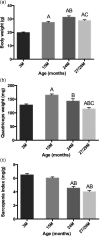New horizons in the pathogenesis, diagnosis and management of sarcopenia
- PMID: 23315797
- PMCID: PMC3575121
- DOI: 10.1093/ageing/afs191
New horizons in the pathogenesis, diagnosis and management of sarcopenia
Abstract
Sarcopenia is the age-related loss of skeletal muscle mass and function. It is now recognised as a major clinical problem for older people and research in the area is expanding exponentially. One of the most important recent developments has been convergence in the operational definition of sarcopenia combining measures of muscle mass and strength or physical performance. This has been accompanied by considerable progress in understanding of pathogenesis from animal models of sarcopenia. Well-described risk factors include age, gender and levels of physical activity and this knowledge is now being translated into effective management strategies including resistance exercise with recent interest in the additional role of nutritional intervention. Sarcopenia is currently a major focus for drug discovery and development although there remains debate about the best primary outcome measure for trials, and various promising avenues to date have proved unsatisfactory. The concept of 'new tricks for old drugs' is, however, promising, for example, there is some evidence that the angiotensin-converting enzyme inhibitors may improve physical performance. Future directions will include a deeper understanding of the molecular and cellular mechanisms of sarcopenia and the application of a lifecourse approach to understanding aetiology as well as to informing the optimal timing of interventions.
Figures



References
-
- Sayer AA. Sarcopenia. BMJ. 2010;341:c4097. - PubMed
-
- Janssen I, Shepard DS, Katzmarzyk PT, Roubenoff R. The healthcare costs of sarcopenia in the United States. J Am Geriatr Soc. 2004;52:80–85. - PubMed
-
- Sayer AA, Dennison EM, Syddall HE, Gilbody HJ, Phillips DI, Cooper C. Type 2 diabetes, muscle strength, and impaired physical function: the tip of the iceberg? Diabetes Care. 2005;28:2541–2. - PubMed
Publication types
MeSH terms
Grants and funding
- MC_UP_A620_1015/MRC_/Medical Research Council/United Kingdom
- U.1475.00.003.00010.02(74238)/MRC_/Medical Research Council/United Kingdom
- 13147/ARC_/Arthritis Research UK/United Kingdom
- MC_UU_12011/2/MRC_/Medical Research Council/United Kingdom
- MC_U147585819/MRC_/Medical Research Council/United Kingdom
- U.1475.00.003.00010.02(74242)/MRC_/Medical Research Council/United Kingdom
- MC_U147574236/MRC_/Medical Research Council/United Kingdom
- 13085/ARC_/Arthritis Research UK/United Kingdom
- MC_U147574233/MRC_/Medical Research Council/United Kingdom
- 17265/ARC_/Arthritis Research UK/United Kingdom
- U.1475.00.002.00001.01(74218)/MRC_/Medical Research Council/United Kingdom
- 16349/ARC_/Arthritis Research UK/United Kingdom
- MC_U147585827/MRC_/Medical Research Council/United Kingdom
- 13181/ARC_/Arthritis Research UK/United Kingdom
- 17702/ARC_/Arthritis Research UK/United Kingdom
- MC_U147574215/MRC_/Medical Research Council/United Kingdom
- 17413/ARC_/Arthritis Research UK/United Kingdom
- 13157/ARC_/Arthritis Research UK/United Kingdom
- MC_UP_A620_1014/MRC_/Medical Research Council/United Kingdom
- 13230/ARC_/Arthritis Research UK/United Kingdom
- MC_U147574218/MRC_/Medical Research Council/United Kingdom
- 16095/ARC_/Arthritis Research UK/United Kingdom
- G0400491/MRC_/Medical Research Council/United Kingdom
- MC_U147574217/MRC_/Medical Research Council/United Kingdom
- MC_U147585824/MRC_/Medical Research Council/United Kingdom
- MC_U147574221/MRC_/Medical Research Council/United Kingdom
- U.1475.00.003.00010.02(74237)/MRC_/Medical Research Council/United Kingdom
LinkOut - more resources
Full Text Sources
Other Literature Sources
Medical

